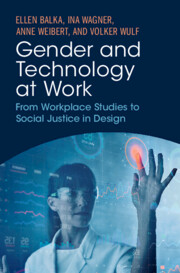Book contents
- Gender and Technology at Work
- Gender and Technology at Work
- Copyright page
- Contents
- Preface
- 0 Introduction
- Part I Gender and Technology
- Part II Gender and Technology at the Workplace
- 4 Women and Machines in the Factory
- 5 Office Automation and the Redesign of Work
- 6 Beyond the Office
- 7 AI-Based Technologies
- 8 The Computerization of Care Work
- 9 The Gendering of Computer Work
- Part III Gender and Design
- Postscript
- References
- Index
4 - Women and Machines in the Factory
from Part II - Gender and Technology at the Workplace
Published online by Cambridge University Press: 28 March 2024
- Gender and Technology at Work
- Gender and Technology at Work
- Copyright page
- Contents
- Preface
- 0 Introduction
- Part I Gender and Technology
- Part II Gender and Technology at the Workplace
- 4 Women and Machines in the Factory
- 5 Office Automation and the Redesign of Work
- 6 Beyond the Office
- 7 AI-Based Technologies
- 8 The Computerization of Care Work
- 9 The Gendering of Computer Work
- Part III Gender and Design
- Postscript
- References
- Index
Summary
Factory work was and still is strongly connected with images of masculinity and the ideal worker being a man. The chapter starts out with historical studies of women’s work in the electronics industry, meatpacking, and the automotive industry. The findings from these studies point to theories of the gendered organization: the gender subtext in organizations and its ‘omnirelevance’, the institutional nature of gendered notions of skill and performance, as well as the diversity and persistence of masculinities. Images of masculinity, one of the main barriers to ‘undoing gender’ in modern industrial settings, are particularly dominant in male-dominated industrial companies – in construction, mining, oil and gas – which continue resisting acceptance of women workers and women engineers, although new technologies have reduced the physical strains of the work together with a shift of skills requirements. The chapter also discusses feminist research on the gender dynamics of globalization of production and household relations based on cases studies in East Asian countries. It concludes with design considerations for the modern industrial workplace.
- Type
- Chapter
- Information
- Gender and Technology at WorkFrom Workplace Studies to Social Justice in Design, pp. 99 - 132Publisher: Cambridge University PressPrint publication year: 2024



